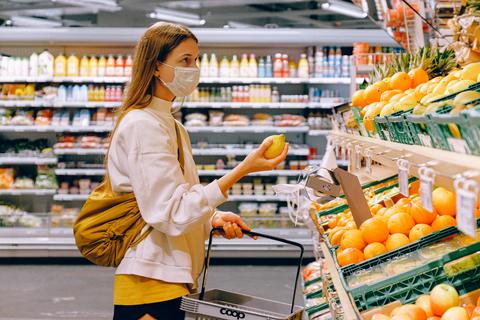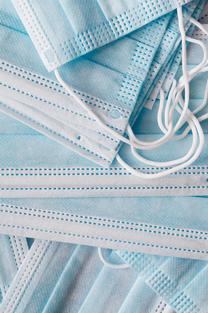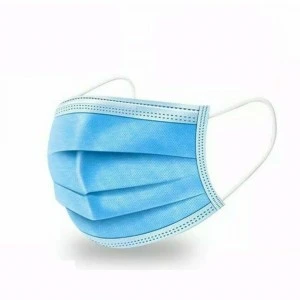Why you should wear a face mask
Studies have shown that many people who have contracted Coronavirus (COVID-19) may not exhibit any symptoms immediately, while others may experience mild or no symptoms at all.
This means you could carry the virus unknowingly and pass it on to other people.
COVID-19 is spread via water droplets. So, when infected people talk, cough, or sneeze, these droplets can then fall onto surfaces that other people may come into contact with.
New evidence has arisen from the World Health Organization, which may suggest aerosols (small particles in the air) as a potential vector of COVID-19 transmission.
If this is the case, it would mean that an infected individual does not need to cough directly on a person or surface for another person to pick up the virus. Instead, the virus could linger in the air of enclosed spaces, such as pubs and shops.
This is why wearing a face covering is so important. By wearing something over your nose and mouth, you create a barrier against these droplets and limit the risk of spreading any further germs. This ultimately helps prevent you from spreading COVID-19 to other people.
How effective are face masks?
A new study claims that wearing a face mask can reduce your risk of contracting COVID-19 by 65%. It is especially important to wear a face mask in places where you will be in close proximity to other people, such as when shopping or using public transportation.
While some masks offer better protection than others, the UK government advises using a face covering, allowing the use of readily available items such as a scarf or bandanna.
The government say:
“Evidence suggests that wearing a face covering does not protect you. However, if you are infected but have not yet developed symptoms, it may provide some protection for others you come into close contact with.”
Aside from wearing a mask, it's also important to know how to safely put on and take off face masks. Knowing this can prevent you from accidentally infecting yourself or other people.
Do I need to wear a mask?
 Face coverings are compulsory on all forms of public transport in England and should also be worn by staff, outpatients and visitors in hospitals. People going to the shops are also advised to wear a face mask if social distancing is not possible.
Face coverings are compulsory on all forms of public transport in England and should also be worn by staff, outpatients and visitors in hospitals. People going to the shops are also advised to wear a face mask if social distancing is not possible.
From the 24th of July, face coverings will also be compulsory in shops. Failure to comply with these new measures can result in a fine of up to £100. You may be denied entry into an establishment if you are not donning a face covering, too, so it's important to be prepared for this.
In Scotland, face masks are already mandatory on all public transport and shops.
In Wales, people are being advised to wear non-medical face coverings where social distancing is not possible, but it is not compulsory.
In Northern Ireland, plans to make wearing face masks on public transport compulsory have been put on hold for now pending legal clarification.
What Type of Face Mask/Face Covering is Best to Use?
While healthcare professionals, such as doctors and nurses, are advised to wear medical-grade FFP3 face masks, the public is advised to wear simpler face coverings, such as surgical masks.
Surgical Face Masks
- High filtration
- Snug Fitting
- Hypoallergenic
You can also make your own face coverings from an old t-shirt, scarves, bandannas or other fabric. The government published detailed instructions on how to make a homemade face mask online.
However, wearing a face mask can be more difficult if you have sensitive skin, as it may cause or aggravate skin conditions such as acne, rosacea, and eczema.
Do Face Masks Cause Acne?
Due to the moist, humid environment caused by wearing a face mask, it traps sweat, natural oils, and dead skin, which can lead to an acne breakout.
This type of acne has been given the nickname 'maskne' – a contraction of 'mask' and 'acne'. If you have been experiencing maskne, please read our recent blog post, 'How to Avoid Acne from Wearing Face Masks,' for advice.
We also offer a range of acne treatments that are available for online ordering and can be delivered to you the next day.
You can also ask a pharmacist about over-the-counter treatments which can help to reduce your acne symptoms. They will be able to advise you on the most suitable treatment for your skin type.
If nothing is helping ease your maskne, or it is getting worse, then make an appointment to see your doctor. They will be able to advise you further on treatments which might be more suitable for your skin.
Who Is Exempt From Wearing Face Mask/Face Covering?
 It is important to be aware that there are certain people who may not be able to wear any type of face mask or covering due to health and environmental reasons such as:
It is important to be aware that there are certain people who may not be able to wear any type of face mask or covering due to health and environmental reasons such as:
- If they have a physical or mental illness or impairment, or a disability, that means they cannot put on, wear or remove a face mask.
- If putting on, wearing or removing a face mask causes them severe distress.
- If they are travelling with or providing assistance to someone who relies on lip-reading to communicate.
- If they are travelling to avoid injury or to escape the risk of harm and do not have a face mask with them.
- If they need to remove it during their journey to avoid harm or injury or the risk of harm or injury to themselves or others.
- If they need to eat, drink or take medication, then they can remove their face mask.
- If they are asked to remove their face mask by a police officer or any other official, for example, to check their railcard.
For people with breathing difficulties, such as asthma, Asthma UK recommends trying a different fabric, such as a scarf or bandanna, or a homemade face mask, rather than a medical-type face mask.
However, if it makes them feel more breathless or suffocated, the Government has advised that they don’t have to wear one.
You can find Government guidance online, which includes a full list of people exempt from wearing a face mask.
If you are still unsure about the use of face masks, The World Health Organization (WHO) have detailed advice for the public on when and how to use face masks.
For those looking to buy a face mask, you can buy them online from our website. We offer next-day delivery on all orders from our UK-based pharmacy. All our masks are high quality.
© 2013 - 2026 Al Muhsineen Limited. All Rights Reserved. Registered Pharmacy: 34 Halliwell Road, Bolton BL1 8RL. Registered Office: 254 First Floor, Shearbrow, Blackburn, England, BB1 8DS







